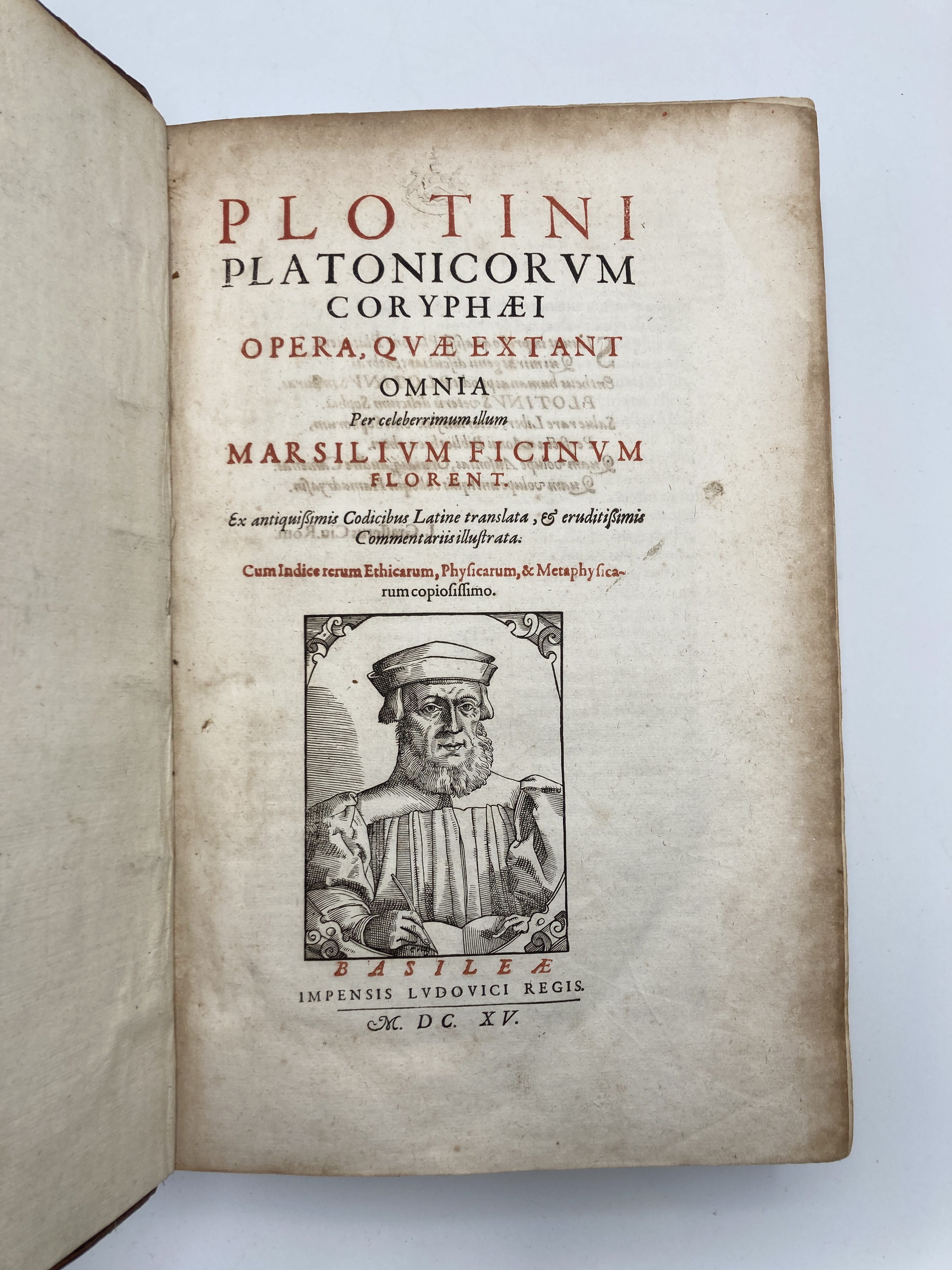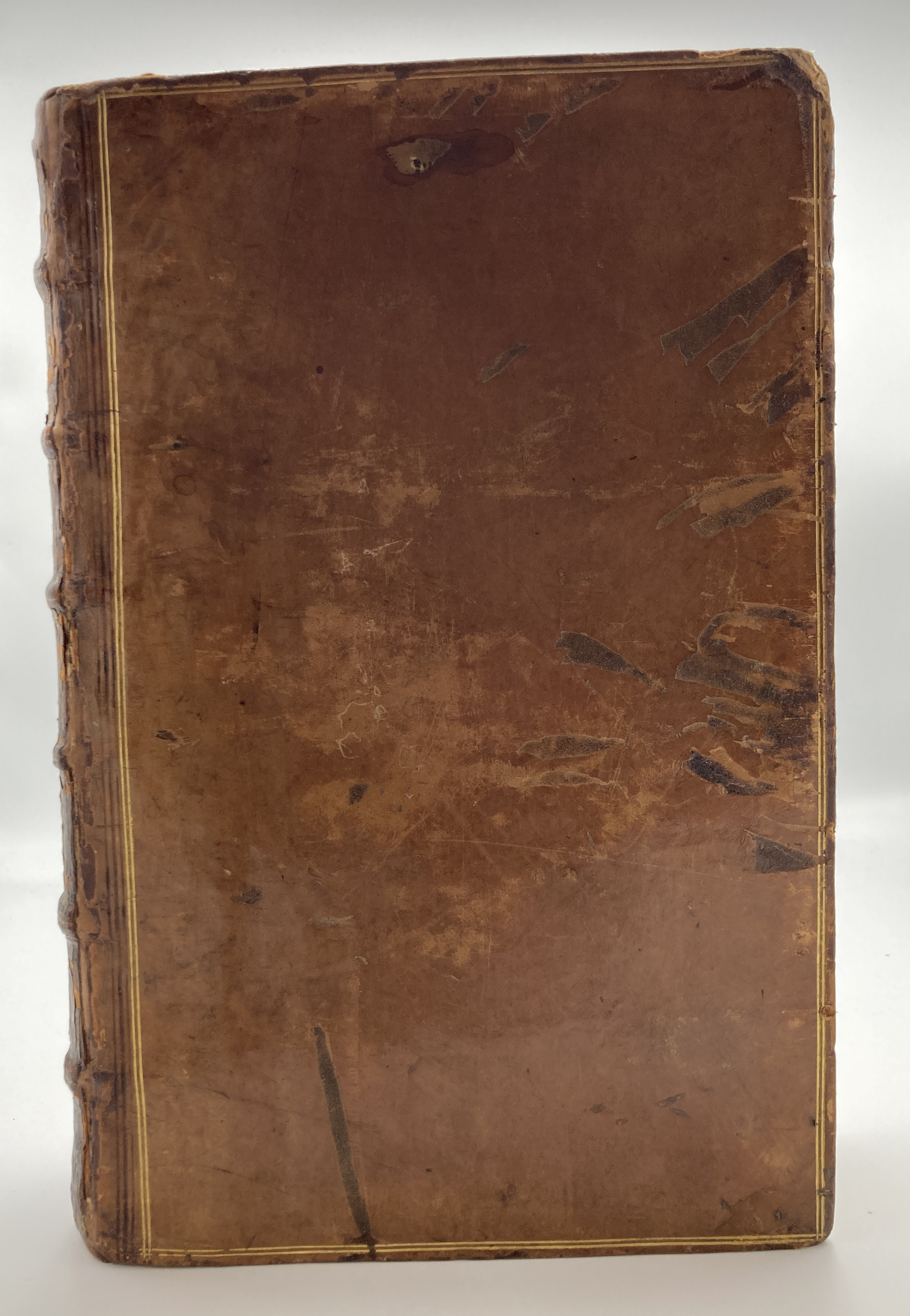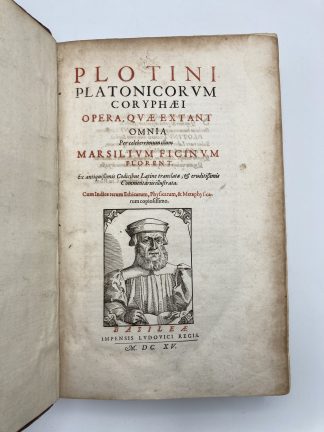PLOTINUS.
PIONEER OF VEGETARIANISM
Plotini Platonicorum coryphaei opera.
Basel, Ludwig Koenig, 1615.£2,950.00
FIRST EDITION, second issue. Folio. pp. [xxxvi], 773 [i.e. 771], [xlv]. Greek and Latin text in parallel column. Greek and Roman letter, commentary in Italic. Title in red and black with woodcut portrait, woodcut printer’s device on recto of last, charming historiated woodcut initials and headpieces, armorial bookplate of the Earl of Macclesfield on pastedown, Shirburn Castle blind-stamp to first four ll. Light age yellowing, occasional light browning and minor mainly marginal spotting, small marginal water stain to first 3 gatherings. A good, clean, well-margined copy in contemporary French calf, rebacked, original spine laid down, double gilt ruled, spine gilt, raised bands, all edges sprinkled red, upper corners a bit worn, few scratches to covers.
A reissue of the Editio Princeps of the Greek text of Plotinus’ opera accompanied by Ficino’s Latin translation and his notes using the original sheets, with the title and first quire reprinted by his successor K. von Waldkirch. ‘Première édition, assez rare, mais incorrecte: on n’en recherche que les exemplaires bien conservés… Quelques exemplaires ont un nouveau titre date de 1615, et 6ff. réimprimés’ (Brunet IV:727). This rare first edition was based on four separate mss of the text. Plotinus (204-270) ‘may justly be regarded as the true founder of Neo-Platonism, in so far as he perpetuated its principles in a written form’ (Sandys, I:343). The first and most influential of the Neo-Platonists, Plotinus’ writings on the importance of art and beauty, so different from Plato’s, were especially significant to the Renaissance.
The editio princeps of Plotinus’s Greek text was printed by Petrus Perna in Basel in 1580. The same sheets, including Perna’s original dedication, were used for the second issue, just altering the t-p. The text has been edited, with a Latin translation, by the Neo-Platonist philosopher Marsilio Ficino (1433-99), from mss given to him by Cosimo de’ Medici. Born in Egypt, Plotinus (204-70AD) studied philosophy at Alexandria under Ammonius Sacca; his most important ideas, which greatly influenced pagan, Judeo-Christian and Islamic metaphysics, concern the One, the Soul and the Intellect. This edition begins with his disciple Porphyry’s famous biographical account. Plotinus, he wrote, ‘abstained from animal flesh’ and ‘would not swallow medication containing animal products’, information which fed into early modern debates on vegetarianism and the ethics of meat eating. Through Ficino’s translation of Porphyry’s ‘De abstinentia’, and together with the theories of other Platonists like Porphyry and Iamblichus, Plotinus’s ideas on the rationality of animals were similarly influential (Muratori, ‘Renaissance Vegetarianism’, 2, 43). The rest of the work is occupied by the six ‘Enneads’, based on the writings of his student Porphyry. In the Renaissance, Plotinus provided fertile philosophical ground for the Neo-Platonist reconciliation of Platonism and Christianity, as he took a new and original approach to the interpretations of the later Platonic and Aristotelian commentators. ‘Plotinus was recognized as the most authoritative interpreter of Platonism. […] His thought was the (sometimes unacknowledged) basis for opposition to the competing and increasingly influential tradition of scientific philosophy’ (Stanford Dic. Phil.). A good copy, from the extraordinary library of the Earls of Macclesfield at Shirburn Castle.
BM STC C17th Ger. P 775. Sandys II:105; Graesse 5:352; Brunet IV:727.




